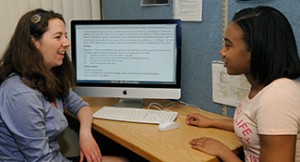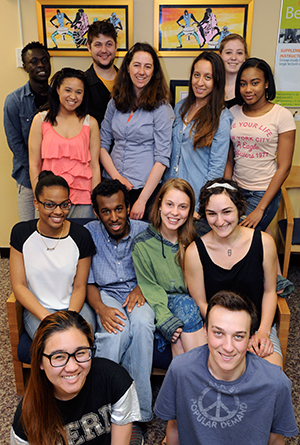This post is contributed by Dr. Ellen McShane, Director of Academic Success Programs at UVM.
Author George D. Kuh (2008) has identified collaborative learning experiences as a “high-impact practice” that allows students to succeed in college. Collaborative learning experiences can include study groups in courses, team-based course assignments, peer tutoring, and cooperative learning projects that include research.

Sierra Kloutz, Class of 2015, tutors a student in the Learning Co-op. Sierra served as the study group leader for Psych 001 in Fall 2014 for CNHS first-year students.
Photo by Paul O. Boisvert
Over the last two years, the Learning Co-op and the College of Nursing and Health Sciences (CNHS) have collaborated to place all first-year CNHS students in peer-tutor-led study groups through the college’s first-year experience course, NH 050.

Learning Co-op Tutors and Staff
Photo by Paul O. Boisvert
This year, the entirety of the first-year cohort participated; 246 first-year students were officially scheduled into study groups. Out of that group, 186 of them completed the requirement of attending six total study group sessions throughout the semester.
Of those who fell short, many of them attended four or five sessions. Of the 246 students we scheduled for sessions, only seven of them had zero contacts. In the end, over 97% of first-year CNHS students had at least one point of contact with a tutor this semester, with over 72% spending six or more hours with tutors. Some students chose to spend as much as ten hours in study groups.
We can say with certainty that no other college comes close to that amount of time spent in structured learning environments outside of lectures.
How has the collaboration between the Learning Co-op and CNHS impacted student success and retention? Stay tuned for another blog post next semester. We plan to gather data over the next several months to see how these efforts have impacted retention.
If you are interested in exploring a college-wide or course-specific collaborative learning experience, please contact Keith M. Williams in the Learning Co-op
at 656-7964.
Kuh, George D. High-impact educational practices: What they are, who has access to them, and why they matter. Washington, D.C.: Association of American Colleges & University Publishing, 2008.
